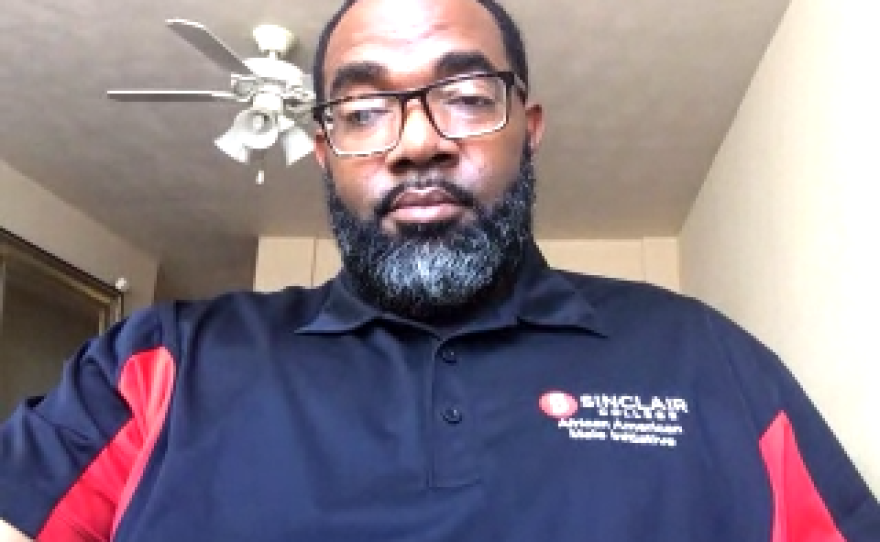Daniel Peoples came out of prison and entered the African-American Male Initiative at Sinclair Community College in Dayton, a program designed to provide support to men of color who are working to complete their degrees. As part of our series called Lighting the Fire, Daniel talks to Marc DeWitt – the program coordinator.
Daniel Peoples: At the time, I was probably about to be 21 and I had almost five years in prison. I had a visit from my mom and it was the first time I'd seen her in a long time she had a lot of a grey hair. Oh. She had gotten a lot of grayer. And then I was like, 'Damn, I did that, when I made a mistake in my life." And I'm like, "What I'm going to do when I get out of here to stop somebody from going through what I went through?"
Marc DeWitt: What was that like to come from your background, come to Sinclair, and then you got a room full of 40, 50 black men like vehemently chasing degree completion.
Daniel Peoples: It was intimidating, to be honest, because at the time I just turned 26, so I was the oldest. But it was beautiful. It was motivational. I knew after that first day my life changed. So it was life changing. I never seen that many young brothers who look like me in one place, all on the same goal.
Marc DeWitt: You know, college and the community college is a very transactional place. 'Hey, Daniel, here I'm your advisor academically. The transaction is I help you make a schedule. But then something happens after you come for so along. Then there's this ornate trust that that begins to just emanate from the room. And then it's..."Well, how do I... start a business? How do I deal with custody of my kids? How do I get my driver's license back?" And then it becomes this transformative, like life coaching and mentoring opportunities that become part of the process. You don't just come here for school. You come because you want to be a part of something that's bigger than you.
Daniel Peoples: The program really pushes you. It puts your problems in your face. It makes you deal with it. It makes you grow up. You have your peers who want you to be better. I mean, we both see people crack under pressure. We've seen people excel. You know, the program molds you to the man that you want to be in life.
Marc DeWitt: What memory of his time you think will stay with you?
Daniel Peoples: That shirt.
Marc DeWitt: Oh! The civil rights tour.
Daniel Peoples: The civil rights tour. Our program takes us all on educational trips that are life changing. What I had to go through to even go through the program was crazy because I'm on the lowest version of parole. For some reason, my parole officer was strict on Atlanta.
Marc DeWitt: I remember that.
Daniel Peoples: She was like, 'When you go to Atlanta, I need to know you're in Atlanta.' Fast forward, when we was in Atlanta, went to the Hawks game. So at the Hawks game they had their own police station precinct in the stadium. I go in there. I'm on parole, lower supervision, but I'm doing the right thing by notifying the police. And the cop looked at me so crazy. He was like, 'I've never heard of this. I don't even think you shoulda came.' He said, 'Stay right here.' I'm like, 'I'm about to get arrested for here, but checking in?' So he was making all these calls, taking a paper, being very aggressive with me in front of brother Raheem and Ricky. And they was looking and I just turned around, and I was like, 'You see why I be on ya'll to never ever to get in trouble?"
Marc DeWitt: Yeah.
Daniel Peoples: And it was like a surreal moment because they had to see what I had to endure. And I had to take a picture in front of the precinct just for evidence. And they was like, Bro, that's a lot. That's a lot. And I was like, Now we see. So it was a surreal moment. And then I got tested. It was a test, but, I knew everything was going to be cool eventually.
Marc DeWitt: I'm extremely proud to know you. I'm extremely proud to have anything to do with you having been part of this program. And so it's it's not just from the standpoint of the metrics are better because you graduated on time, you know, our numbers look better because you had the high GPA. It's about, you know, I helped Daniel and I know what that's going to pay dividends to the next couple of guys that Daniel reaches out to. And thank you for your time. Appreciate it. Thank you. Love you, Bro.
Daniel Peoples: Love you, too.
Our series – called Lighting the Fire – is produced by David Seitz. These interviews were recorded on Zoom during the pandemic as a collaboration between Learn to Earn Dayton, Strive Together, a Cincinnati non-profit and Story Corps.


